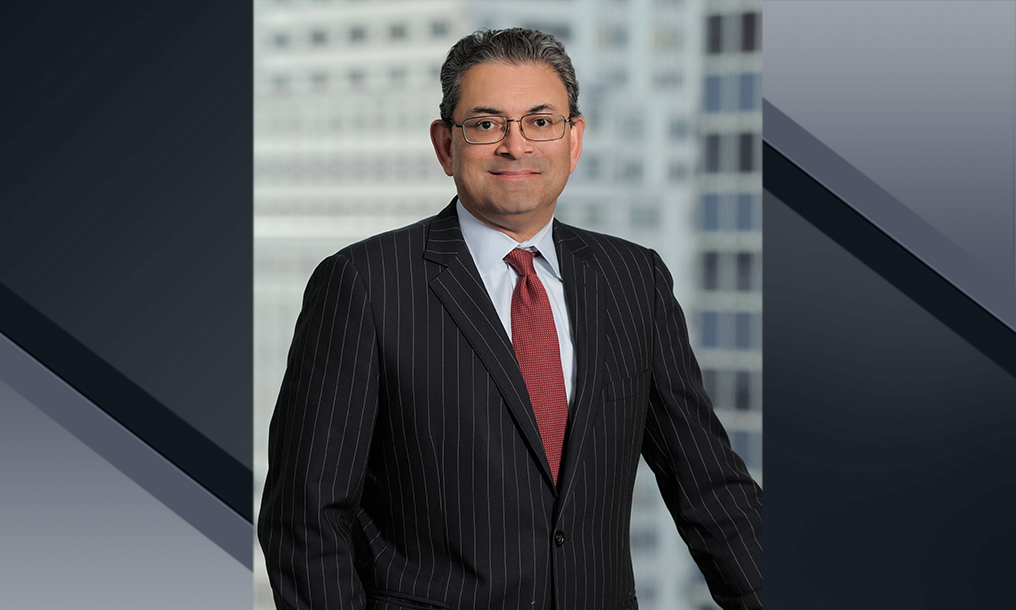What are some of your proudest recent achievements?
The successful defense of our banking clients in complex financial products litigation has been a point of professional pride for me. I went to law school in part to combine my interest in economics with the law and am very grateful that my career has developed is such a way that law and economics is the cornerstone of my practice.
In addition to leading the financial markets litigation practice of the firm, I have been a highly active member of the American India Foundation and the South Asian Bar Association. I was born in India and moved to the United States at the age of 16. I started my legal career in 1992, when it was still quite rare to find South Asian lawyers at any U.S. law firms, let alone South Asian litigators. My experiences early in my career have driven my efforts to mentor and assist other diverse lawyers. I have a passion for diversity and inclusion, and help with efforts to identify and foster the development of diverse legal talent across the firm.
Name a lawyer or mentor whose leadership inspired you.
My early career was shaped and heavily influenced by my original mentor at Jones Day—David Carden, who hired me and who led the firm’s securities litigation practice for many years. But, the mentor who most shaped my professional development as a practice leader and inspired me to become a mentor to younger lawyers was Mark Sisitsky, a now-retired transactional banking lawyer, who led Jones Day’s banking and finance practice through its early formative years. Mark was a source of professional inspiration not only because of his intense legal acumen, but also his adaptability to changing market conditions and legal developments, which I witnessed first-hand as he navigated the firm’s clients through the 2008 financial crisis.
How are the business and profession of law changing, and how should lawyers adapt for the future?
Traditionally, lawyers were defined solely by a narrow area of specialization and, while those areas of specialization are vital, they are not enough anymore. Clients want litigators who understand their business and their products and regulatory lawyers who understand their industry. I remember during the last financial crisis, one transactional lawyer I worked closely with completely immersed himself into the litigation side of things. He knew the products being litigated so understood that part very well, but had to learn to pivot and use that expertise to help review and shape litigation documents. Clients now seek to engage firms on a global basis to work with one team of lawyers that can cover their specialized needs across geographies and transaction types. Lawyers should be open-minded to learn an area that might not be directly in their wheelhouse—lawyers who are overly specialized will become more a rarity. It’s all about staying fluid and willing to learn new things at any stage of your career.
Also, many clients are focusing on diversity in the workplace, which is great for me as a diverse lawyer to see. We need to work even harder going forward to make sure our workforce is reflective of the ever-changing demographics of the market and the needs of our clients.
What is the best advice for someone considering a career in law, or someone already in the profession who is seeking to make a greater impact?
It’s perfectly acceptable to work on both litigation and transactional (and regulatory) matters. The broader your experience, the more valuable a lawyer you will be.
And, if there’s one thing that I can’t stress enough—and all the associates I work with can vouch for this—speak up and take initiative. I value very much a lawyer who hears about an issue on a call or in a meeting and takes the initiative to research that topic or stay on top of it and bring it up when there are relevant changes.
NOT FOR REPRINT
© 2024 ALM Global, LLC, All Rights Reserved. Request academic re-use from www.copyright.com. All other uses, submit a request to [email protected]. For more information visit Asset & Logo Licensing.


 Jayant (Jay) W. Tambe
Jayant (Jay) W. Tambe








